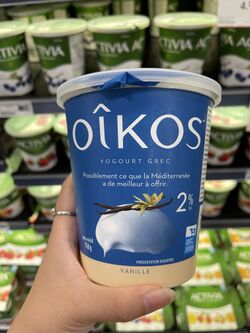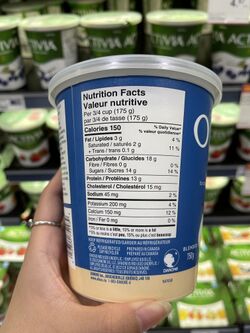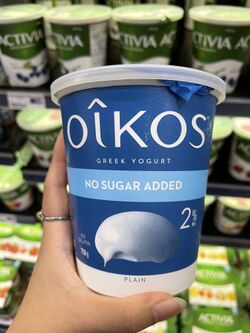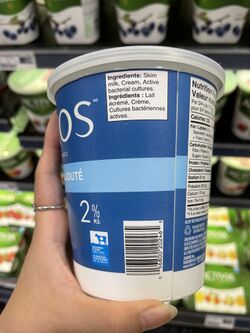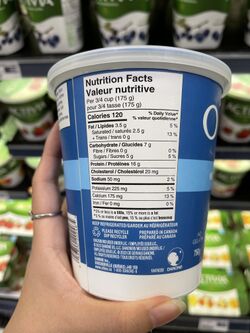Course:FNH200/Assignments/2023/Oikos Greek Yogurt
Brief Introduction
Oikos Greek Yogurt produces a wide array of yogurts as well as drinks. They pride themselves on their thick and creamy yogurt attributed to their unique process and personal cultures used int he production of the yogurts. Oikos produces greek yogurts with a wide range of flavours as well as ingredients, with flavours from mixed berries to lemon meringue. They also produce yogurts to cater to a diverse customer base, producing lactose free yogurts to high-protein yogurts and yogurts that are ranging in creaminess from 0% to 11%.[1]
Our team aims to compare the vanilla flavour and no sugar added versions of this yogurt.
Products Pictures
Oikos Greek Yogurt - Regular vanilla flavour:
Oikos Greek Yogurt - No sugar added:
Ingredient Lists
| Oikos Regular Yogurt | Oikos No Sugar Added Yogurt |
|---|---|
|
|
Additives and Substitutes
Fat Substitutes
No fat substitutes are used.
Sugar Substitutes
Cane Sugar
Cane sugar is similar to granulated sugar, but is made from sugar-cane (Saccharum officinarum) or sugar beets[2], and goes through less processing. Cane sugar crystals are slightly larger than regular granulated white sugar and are also slightly golden compared to the usual white.[3] However, the sucrose molecules in cane sugar and regular table sugar are identical so there isn't much of a difference in terms of sweetness.
Additives
Active Bacterial Cultures
Active bacterial cultures help digest the milk and cream to result in the creamy texture of yogurts through fermentation. In detail, two types of bacteria, Lactobacillus bulgaricus and Streptococcus thermophilus, are added to the milk, and is then warmed. The bacteria convert lactose in milk into lactic acid, which then curdles the milk[4].
Corn Starch
Corn starch is extracted from the endosperm of corn. It is widely used as a thickening agent for many different types of food, due to its long chains of starch molecules that unravel and swell when heated, through the process of gelatinisation.[5] It is used in Oikos Greek Yogurt to give it its thick consistency.
Locust Bean Gum
Locust bean gum, is a known and regulated food additive, it comes from the carob seeds of the carob tree. It is a hydrocolloid used in food as a thickener, stabiliser and emulsifier and known to not be cold-water soluble. It, just like corn starch have a long chain molecular structure that gives it the ability to turn to gel when heated[6], and therefore also contributes to Oikos Greek Yogurt's thick consistency.
Lemon Juice Concentrate
Lemon juice concentrate is the product of juicing the inner flesh of lemons and heating them to remove their water content[7]. It is commonly used to adjust pH and to balance sweetness.
Compare and Contrast
Similarity: Both yogurts contain these ingredients: 2% skim milk, cream, active bacterial cultures. This shows that both yogurts go through the same process of fermentation with the bacteria and milk to be created. Other than that, we notice that these yogurts are preservative-free, and have similar shelf lives, ranging from 2 to 4 weeks in fridge.
Difference: The biggest difference we can see between the two yogurts are the sugar and additives. As the regular yogurt has a vanilla flavour, we can see a lot of additional ingredients that we don't see in the "no sugar added" yogurt. These include: water, cane sugar, corn starch, natural vanilla flavour, locust bean gum, and lemon juice concentrate. We notice that the only type of sugar used in the regular version is can sugar, and this is absent in the no sugar added version therefore it is true to its name. We also notice a variety of additives in the regular version, two of them being corn starch and locust bean gum. Two of these additives are carbohydrate-based and since it is absent in the no sugar added version, we can see this difference being reflected in the nutrition facts below. The regular version has 18g of carbohydrate per 175g serving while the no sugar added has only 7g.
Labels
| Oikos 2% No Sugar Added | Oikos 2% Vanilla | |||||||||||||||||||||||||||||||||||||||||||||||||||||||||||||||||||||||||||||||||||||||||||
|---|---|---|---|---|---|---|---|---|---|---|---|---|---|---|---|---|---|---|---|---|---|---|---|---|---|---|---|---|---|---|---|---|---|---|---|---|---|---|---|---|---|---|---|---|---|---|---|---|---|---|---|---|---|---|---|---|---|---|---|---|---|---|---|---|---|---|---|---|---|---|---|---|---|---|---|---|---|---|---|---|---|---|---|---|---|---|---|---|---|---|---|---|
| Bilingual Labelling | The label has both English and French language, following the mandatory regulations. | The label has both English and French language, following the mandatory regulations. | ||||||||||||||||||||||||||||||||||||||||||||||||||||||||||||||||||||||||||||||||||||||||||
| Common Name of the Food | It is commonly known as Oikos Greek Yogurt 2% No Sugar Added. (Mentioning % milk fat as required). | It is commonly known as Oikos Greek Yogurt 2% Vanilla. (Mentioning % milk fat as required). | ||||||||||||||||||||||||||||||||||||||||||||||||||||||||||||||||||||||||||||||||||||||||||
| Country of Origin | The country of origin for this product is Canada. It is mentioned in the label, following the mandatory regulations. | The country of origin for this product is Canada. It is mentioned in the label, following the mandatory regulations. | ||||||||||||||||||||||||||||||||||||||||||||||||||||||||||||||||||||||||||||||||||||||||||
| Date Marking and Storage Instructions | The best before date is printed on top of the packaging: BB/MA 2023 AU 23 22:47.
The storage instructions is shown on the label: Keep Refrigerated. The shelf life of the greek yogurt is generally 5-7 days after opening. |
The best before date is printed on top of the packaging: BB/MA 2023 AU 25 21:54.
The storage instructions is shown on the label: Keep Refrigerated. The shelf life of the greek yogurt is generally 5-7 days after opening. | ||||||||||||||||||||||||||||||||||||||||||||||||||||||||||||||||||||||||||||||||||||||||||
| Identity and Principal Place of Business | The principal place of business of Danone Inc. is in Boucherville, QC J4B 1E6. | The principal place of business of Danone Inc. is in Boucherville, QC J4B 1E6. | ||||||||||||||||||||||||||||||||||||||||||||||||||||||||||||||||||||||||||||||||||||||||||
| Irradiated Foods | The product is not irradiated, so it is not on the labels. | The product is not irradiated, so it is not on the labels. | ||||||||||||||||||||||||||||||||||||||||||||||||||||||||||||||||||||||||||||||||||||||||||
| Legibility and Location | The information on the label can be easily read and the product is easily available in Canada. | The information on the label can be easily read and the product is easily available in Canada. | ||||||||||||||||||||||||||||||||||||||||||||||||||||||||||||||||||||||||||||||||||||||||||
| List of Ingredients | Skim milk, Cream, Active bacterial cultures. | Yogurt (skim milk, cream, active bacterial cultures)
Vanilla preparation (water, cane sugar, corn starch, natural vanilla flavour, locust bean gum, lemon juice concentrate). | ||||||||||||||||||||||||||||||||||||||||||||||||||||||||||||||||||||||||||||||||||||||||||
| Nutrition facts |
|
| ||||||||||||||||||||||||||||||||||||||||||||||||||||||||||||||||||||||||||||||||||||||||||
| Net Quantity of Food | The net weight of this product is 750g and clearly stated at the front of the label. | The net weight of this product is 750g and clearly stated at the front of the label. | ||||||||||||||||||||||||||||||||||||||||||||||||||||||||||||||||||||||||||||||||||||||||||
| Sweetners | X | Cane sugar. | ||||||||||||||||||||||||||||||||||||||||||||||||||||||||||||||||||||||||||||||||||||||||||
| Additives | Active bacterial cultures. | Active bacterial cultures, corn starch, locust bean gum, and lemon juice concentrate. | ||||||||||||||||||||||||||||||||||||||||||||||||||||||||||||||||||||||||||||||||||||||||||
| Claim and Statement | All the information listed above complies with the labelling regulations we learned in lesson 4. All the mandatory informations, including some extra ones are included in both product labels. | |||||||||||||||||||||||||||||||||||||||||||||||||||||||||||||||||||||||||||||||||||||||||||
References
| This Food Science resource was created by Course:FNH200. |

